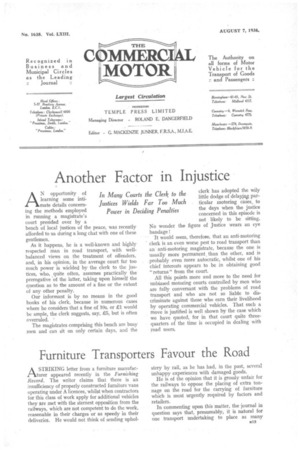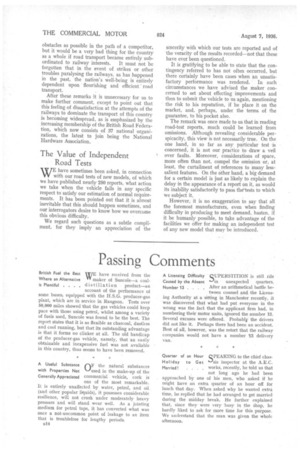Furniture Transporters Favour the Road
Page 23

Page 24

If you've noticed an error in this article please click here to report it so we can fix it.
ASTRIKING letter from a furniture manufacturer appeared recently in the Furnishing Record. The writer claims that there is an insufficiency of properly constructed furniture vans operating under A licences, whilst when contractors for this class of work apply for additional vehicles they are met with the sternest opposition from the railways, which are not competent to do the work, reasonable in their charges or as speedy in their deliveries. He would not think of sending uphol stery by rail, as he has had, in the past, several unhappy experiences with damaged goods. He is of the opinion that it is grossly unfair for the railways to oppose the placing of extra tonnage on the road for the carrying of furniture which is most urgently required by factors and retailers.
In commenting upon this matter, the journal in question says that, presumably, it is natural for one transport undertaking to place as many obstacles as possible in the path of a competitor, but it would be a very bad thing for the country as a whole if road transport became entirely sub ordinated to railway interests. It must not be forgotten that in the event of strikes or other troubles paralysing the railways, as has happened in the past, the nation's well-being is entirely dependent upon flourishing and efficient' road transport.
After these remarks it is unnecessary for us to make further comment, except to point out that this feeling of dissatisfaction at the attempts of the railways to dominate the transport of this country is becoming widespread, as is emphasized by the increasing membership of the British Road Federation, which now consists of 37 national organizations, the latest to join being the National Hardware Association.
The Value of Independent Road Tests
WE have sometimes been asked, in connection with our road tests of new models, of which we have published nearly 250 reports, what action we take when the vehicle fails in any specific respect to satisfy our estimation of normal requirements. It has been pointed out that it is almost inevitable that this should happen sometimes, and our interrogators desire to know how we overcome this obvious difficulty.
We regard such questions as a subtle compliment, for they imply an appreciation of the sincerity with which our tests are reported and of the veracity of the results recorded—not that these have ever been questioned.
It is gratifying to be able to state that the contingency referred to has not often occurred, but there certainly have been cases when an unsatisfactory performance was rendered. In such circumstances we have advised the maker concerned to set about effecting improvements and then to submit the vehicle to us again, mentioning the risk to his reputation, if he place it on the market, and, perhaps, under the terms of the guarantee, to his pocket also.
The remark was once made to us that in reading road-test reports, much could be learned from omissions. Although revealing considerable perspicacity, this view is not necessarily true. On the one hand, in so far as any particular test is concerned, it is not our practice to draw a veil over faults. Moreover, considerations of space, more often than not, compel the omission or, at least, the curtailment of references to many lesssalient features. On the other hand, a big demand for a certain model is just as likely to explain the delay in the appearance of a report on it, as would its inability satisfactorily to pass the tests to which we subject it. However, it is no exaggeration to say that all the foremost manufacturers, even when finding difficulty in producing to meet demand, hasten, if it be humanly possible, to ta.ke advantage of the facilities we offer for making an independent test of any new model that may be introduced.




















































































